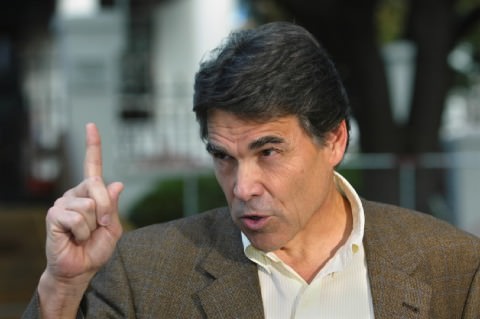 Republican primary front-runner Gov. Rick Perry, was recently quoted as saying that, while he rejects military adventurism, he was “never going to take off the table our ability to have a military solution to a country like Iran.” At first glance, this might appear to be more of the same tough talk that we have grown accustomed to hearing. However, there is a subtle but important difference in Perry’s substitution of “option,” the commonly used term, for “solution.”
Republican primary front-runner Gov. Rick Perry, was recently quoted as saying that, while he rejects military adventurism, he was “never going to take off the table our ability to have a military solution to a country like Iran.” At first glance, this might appear to be more of the same tough talk that we have grown accustomed to hearing. However, there is a subtle but important difference in Perry’s substitution of “option,” the commonly used term, for “solution.”
A military option for Iran typically revolves around U.S. and/or Israeli airstrikes against their nuclear facilities. However, given that there is near universal agreement that even the most successful airstrikes will do little more than delay Iran’s nuclear program (not to mention be a gift to the regime that will galvanize Iranian public support), it seems implausible that by military “solution” he could be referring to airstrikes. Thus, his talk of a military “solution” could reasonably be thought to refer to a military action requiring the use of ground forces, a la Iraq 2003.
Admittedly, focusing on Perry’s use of “solution” rather then “option” might be splitting hairs, and it would not be the first time that a politician was imprecise with his choice of words. But given the importance of potential presidential candidates’ positions on Iran, it is critical that we become familiar with their stances and be wary of subtle shifts in terminology, lest we find ourselves with a president advocating for a war with Iran.
With this in mind, here are some of the other Republican presidential candidates’ quotes and stances on Iran to date:
Former Gov. Mitt Romney:
In the run up to the 2008 Republican presidential primary, Romney said:
Of course, the military option has to be on the table. Anyone who’s considering being president hopefully will say that military options are always on the table when you consider a nation, which is a genocidal nation, a suicidal nation, in some respects, coming from Ahmadinejad…This is a nation where the genocidal inclination is really frightening and having a nation of this nature develop nuclear weaponry is unacceptable to this country and to the Middle East.
Former Gov. Jon Huntsman:
When asked what he would do if Iran develops WMD, Huntsman responded that if ever there was a time to consider using U.S. force, it would be to prevent a nuclear armed Iran.
Rep. Michele Bachmann:
Bachmann is a lead supporter of House Resolution 271, green-lighting Israeli military strikes on Iran. She is also a vocal supporter of the Mujahedin-e Khalq (MEK) and has spoken at pro-MEK events.
Rep. Ron Paul:
At a recent primary debate Paul said there is no concrete evidence to that Iran was pursuing a nuclear weapon. He said a war with Iran would be worse than a nuclear-armed Iran. Paul has said he would “tolerate” a nuclear armed Iran before he would support sending U.S. troops off to fight a war with Iran. Paul has repeatedly voted against sanctions as he sees them as increasing the likelihood of war. He supports dialogue with Iran, saying at the recent debate that the Soviet Union posed a much greater threat than Iran and we had a dialogue this them.
Former Senator Rick Santorum:
At the previously mentioned debate, Santorum rebuked Paul’s positions, saying that Iran has been in a state of war with the U.S. since 1979 and saying that Iran has killed more soldiers in Iraq and Afghanistan then the Iraqis or the Afghanis have. Santorum has highlighted that, while in the Senate, he authored the Iran Freedom Support Act to provide U.S. funds aimed at toppling the Iranian regime. At the debate, he conveyed support for the 1953 coup against Iranian Prime Minister Mossadegh, saying, “I don’t apologize for the Iranian people being free for a long time…”